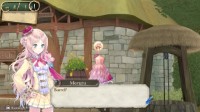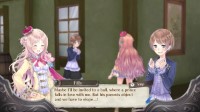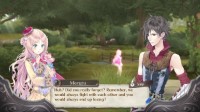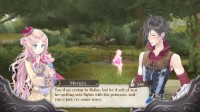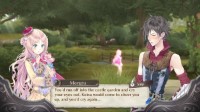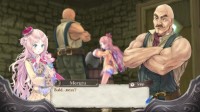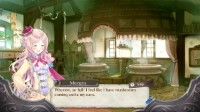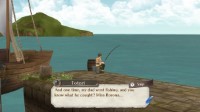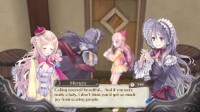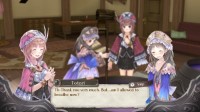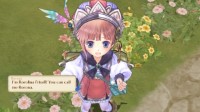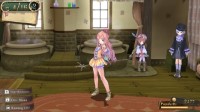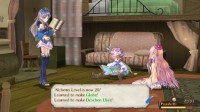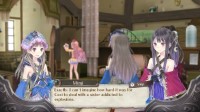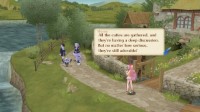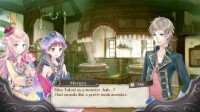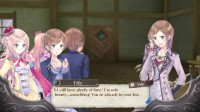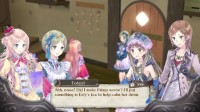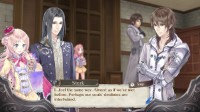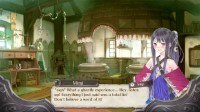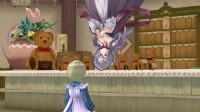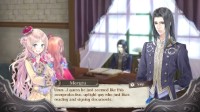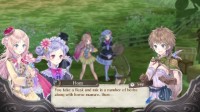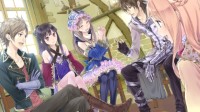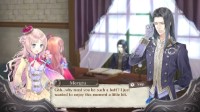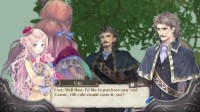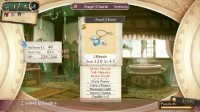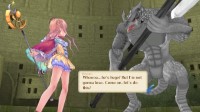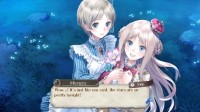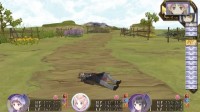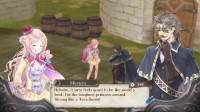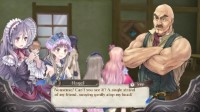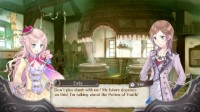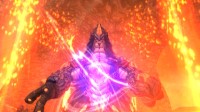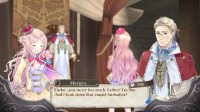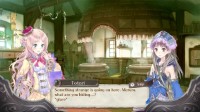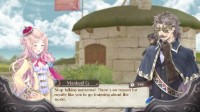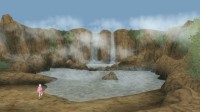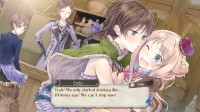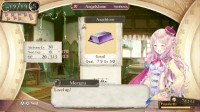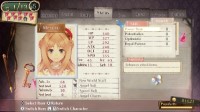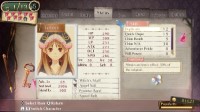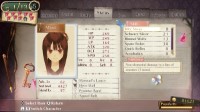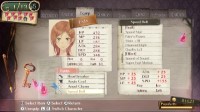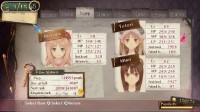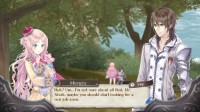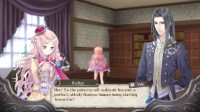Atelier Meruru
Playtime: 56.6 Hours
Finished 03 November 2024.
Just like the other two games in the trilogy, I played the DX version on the Switch. Only did a single NG run, despite the long playtime - I always take way longer than average to finish these games - and I don't really plan on doing a NG+ run since I managed to get through so much of the post-game content already anyway. As mentioned below, I managed to get almost all of the possible NG ending options, except for the Spa Land ending (since that takes like ~6 months of concentrated effort due to the ridiculous amount of manual synthesis required). For some reason, you can't choose your ending in this game though (unlike Totori DX, which came out earlier...) so I got locked into the Strongest Princess ending. Oh well, I enjoyed it anyway! Some additional accomplishments and statistics of my playthrough are listed below - I tried to do as much as I could in one playthrough, but as usual I did get a bit fatigued at the end of the game so slept the last ~2.5 months away.
Miscellaneous Achievements:
- Reached Alchemy Level 50 and Adventurer Level 50+
- Synthesized top-class weapons & armor (Regentium - not Angelstone, Medical Linen)
- Synthesized top-class accessories (Speed Belt, Angel Charm, Promise Band)
- Synthesized top-class consumables (Elixir, Merulixir, Peacemaker, Pinwheel, etc.)
- Synthesized every item available item in the game at least once
- All party members at ~Lv50 or above, main party members (Meruru, Totori, Mimi, Esty) fully equipped
- Most event chains finished, except Gio, Lias, and maybe Sterk (includes Rorona's Pie Shop)
- Reached the required 100,000 population requirement before the end of Year 5 (~135K by the end)
- Reached Kingdom Rank IX (Jupiter), ending with 2890 points of a possible 2950 in NG
- Completed all Dev. Tasks aside from Endless Corridor IV, Peter's Dream II, and Applied Task V
- Completed all Facitility Development except 'Overhaul School' and 'Adventurer's Inn'
- Developed Yuvel and defeated Airshatter to calm the volcano
- Defeated the Twilight Maiden in the Endless Corridor and synthesized the Potion of Youth
- Defeated Void Maiden & Hell Maiden as well (Eternity Goddess is a NG+ level superboss)
- Did most of the Hot Spring events, but didn't craft all of the required pipes
- Took care of the lizard invasion and defeated Masked G
- Achieved all non-conflicting ending requirements possible in NG (except Spa Land)!
The Arland DX trilogy finishes with a third fantastic game in Meruru, crystallizing some of the best aspects of the previous two games into an experience balancing the consistent tasks & benefits of Rorona with the wider exploration & progression of Totori. The premise of Meruru's goal is at a larger scale than the very personal stories of Rorona and Totori as well, as she's tasked with carrying forth the development of the Arls Kingdom as its crown princess. Completed tasks increase the population beyond certain numerical goals that must be met each year, and improve aspects of the citizens' lives to give Meruru various perks related to alchemy or adventuring. It does quite a good job at making you feel like there's some actual purpose to all of the alchemy and exploration that you do, which was somewhat missing from the other games - even if the story itself is still just about as bare as ever.
The plotline of the game is quite minimal and utilitarian; beyond the basic premise summarized previously, there isn't really much more going on outside of some occasional check-ups. Since Meruru is technically heir to the throne (though the kingdom is *peacefully* dissolving into the Arland Republic), her father really doesn't like the idea of her learning alchemy - but is eventually convinced to give her a shot at it under the condition that she must use the knowledge that she learns to help develop Arls into a more advanced society before time is up. The goals for this are primarily tracked based on the population of the kingdom (which starts out comically low, at less than 1000 people), and secondarily tracked on the "Kingdom Rank" of Arls, which advances at certain checkpoints as Meruru completes a variety of tasks based on requests from citizens and assigned by Rufus. Near the end of the game, assuming the player is generally successful in their task, Meruru is granted an additional extension of time (much like Totori), where she gets a chance to push some additional development into a promising territory near Mt. Velus, establishing and improving a small settlement called Yuvel. There, we learn that a previous attempt to expand the reaches of Arls to that region ended in disaster when Airshatter, the Volcano Incarnate destroyed the surrounding area and forced the settlers to evacuate. Defeating the monster and calming the volcano is the last significant portion of the main plot; ultimately nothing too out of the ordinary for an Atelier game (remember the Flauschtraut in Totori).
Again, most of the flavor of the games is found through events that you unlock as you deepen Meruru's friendship with companions and townspeople, and everyone has their own personal - and mostly isolated - story to tell. Mechanically, I understand that this is very necessary in these games because they revolve around a strict calendar schedule and time limit during which the player needs to have sufficient freedom to define their own plans; forcing story events at certain times can be very irritating (as in Rorona) since they can easily ruin your plans, especially if they suck up a significant amount of time (Rorona...). On the other hand, the story threads also feel kind of insulated from one another, such that all of the random events you see feel kind of aimless. Also, when you trigger a ton of them in a row, the game won't spread them out over time so you can end up involuntarily watching character events for over an hour at once. Thankfully, to partially mitigate this, there are a ton of "paired events" in this game where you get to see a few of the characters talking with each other (and Meruru) - which helps cement the idea that some of them (like Totori & Mimi) are really good friends with each other, not just mutual acquaintances of Meruru.
To continue with the characters, I feel like the new ones introduced in Meruru are generally somewhat hit-and-miss, though none of them are necessarily outright bad this time. Lias seems like a somewhat-more-angsty version of Gino, Rufus is a very stereotypical "perfect butler" character (with even a hidden passion for sweets!), Keina has a very sweet personality and great dynamic with Meruru but doesn't have much going on herself, etc. I love Hanna though, she's quite the character and has a pretty funny relationship with Meruru. Again, I feel like the most memorable characters are the ones returning from the previous games, like Hagel (favorite character btw), Pamela, Totori, Mimi, Esty, and several others. Really, there's a few reasons why this tends to be the case - it's nice to see how these familiar faces are doing in the time between the different games (and how they always end up in the same place), it's exciting to get another chance to interact with them, and besides - the characters that reappear tend to be the more popular or memorable ones. For my part, I ended up sticking with Totori, Mimi, and Esty as Meruru's main adventuring companions throughout the game not only because of their utility mechanically, but also because they were some of my favorites from their respective games. But not all of the returning characters are much to my liking; Astrid is as awful as ever (thankfully, I hear this is her last significant appearance), and I never really cared for Gino to be honest. Last but definitely not least, I love Meruru's personality in this game; she feels very distinct from the other two from her boundless energy, yet still has the same airheadedness that kind of defines the Arland alchemists...
But at the end of the day, the mechanics truly define the game. As mentioned previously, Meruru feels very much like an interesting combination of Rorona and Totori, walking a line between the rather strict assignments of Rorona and the extreme open-endedness of Totori. The important point is the way progression works; while Rorona's assignments were strictly based on turning in groups of items and Totori's point system encouraged more exploration than synthesis, Meruru's tasks encourage both, with a very even emphasis on both synthesis AND exploration. Technically though, the only real objective is to get the population of Arls to a certain level within the time limit (30K in 3 years, 100K in 5 years); but in practice, this pretty much absolutely requires the completion of tasks & rank promotions that grant population bonuses. Tasks also grant points that can be used to develop various elements of the Arls Kingdom, such as improving the marketplace to increase the variety of goods while globally reducing prices, or building academic facilities to improve synthesis. The way all of these ideas are implemented in the gameplay allows for a ton of choice in the player's approach, technically allowing for either a synthesis-heavy or exploration-heavy playstyle while still consistently and meaningfully progressing in the game; the numbers are generally tuned nice and low to keep the time limit comfortable, but there is enough content to keep players interested even if they're determined to squeeze every little bit of efficiency possible in the game through multiple playthroughs. One of relatively few minor disappointments I ended up having in this game is that there is no Ruby Prism for me to craft, since I capped off my alchemy achievements in Rorona & Totori with a maximum-quality Prism but couldn't do so here. :(
Overall, given its close similarities with the rest of the trilogy, I didn't find it surprising at all that I ended up loving this game too. In typical fashion, the time limit for this game did stress me out a bit at times (since I enjoy trying to keep things relatively efficient in these games) but the experience was overall enjoyable once I managed to finish it. For an idea of how long these games tend to drag out for me, I started this game in May or so, and only managed to finish at the beginning of November, playing it on and off for almost half a year. The synthesis is simple enough to feel very versatile (particularly when it comes to transferring traits), the actual exploration and combat gameplay is rudimentary but elevated by the variety of items you can spam everywhere, and the overall experience is lighthearted, cozy, and mechanically cohesive enough to maintain a very enjoyable experience throughout. Just like the other Arland games, I'm not sure if it'll be feasible for me to return to this in the future for a NG+ run (currently have no plans for one) but this one playthrough was already very memorable to me.


